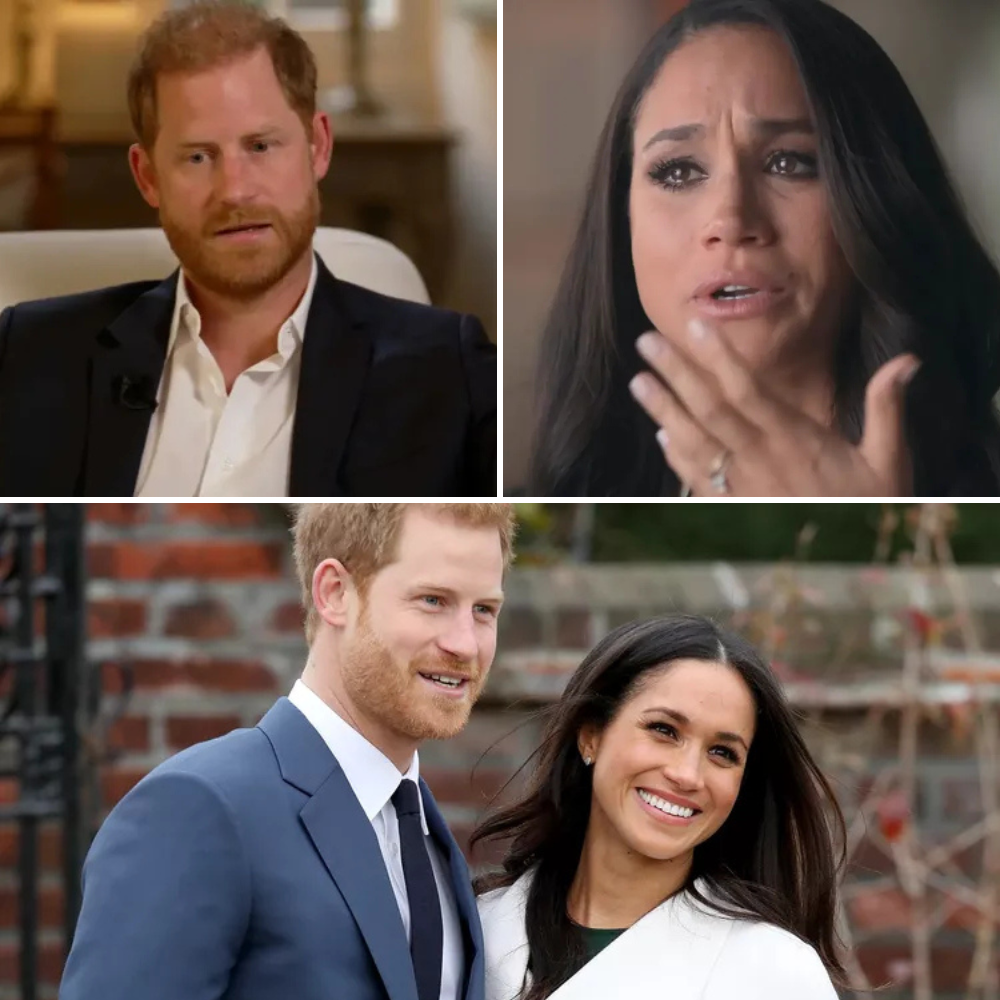
In a surprising twist that has set social media and tabloids ablaze, a rumor has surfaced claiming that Meghan Markle, the Duchess of Sussex, is experiencing memory loss so severe that she no longer remembers her husband, Prince Harry. This sensational narrative, which emerged from unverified sources and speculative posts, has captured public attention, raising questions about mental health, media scrutiny, and the pressures of living in the global spotlight. While no credible evidence supports the claim that Meghan has forgotten Harry, the story provides an opportunity to explore the couple’s documented struggles, the science of memory, and the role of misinformation in shaping public perception.
The Origin of the Rumor
The claim that Meghan Markle is suffering from memory loss and cannot recall Prince Harry appears to stem from a mix of social media speculation and misinterpretations of past statements. Posts on platforms like X have referenced moments where Meghan allegedly downplayed her familiarity with Harry before their relationship, such as a 2016 interview where she was asked to choose between “William or Harry” and appeared to respond casually, saying “Harry” in a way that some interpreted as feigned ignorance. One X post suggested this moment “proved how little she knew” about Harry, fueling narratives that Meghan was unaware of his prominence. However, these interpretations are far removed from any medical diagnosis of memory loss.
Additionally, the rumor may have been amplified by discussions around Prince Harry’s own admissions of memory challenges related to grief. In his 2023 memoir Spare, Harry described how his memory became “spotty” after the death of his mother, Princess Diana, particularly struggling with dates and dialogue while vividly recalling sensory details like landscapes. He noted, “My memory is my memory, it does what it does, gathers and curates as it sees fit, and there’s just as much truth in what I remember and how I remember it as there is in so-called objective facts.” This openness about grief-induced memory issues may have been misconstrued or exaggerated by some to project similar struggles onto Meghan.
No reputable source, including medical professionals or the Sussexes’ own statements, has confirmed any memory loss condition affecting Meghan. Instead, the narrative seems to be a product of sensationalism, possibly driven by detractors or media outlets capitalizing on the couple’s high-profile status. To understand why this rumor has gained traction, it’s essential to examine the couple’s history, their mental health advocacy, and the science of memory.
Meghan and Harry’s Public Journey
Meghan Markle and Prince Harry’s relationship has been one of the most scrutinized in modern history. From their fairy-tale wedding in 2018 to their decision to step back from royal duties in 2020, the couple has faced intense media attention, racism allegations, and public criticism. Their openness about mental health struggles, particularly Meghan’s battle with depression and suicidal thoughts during her pregnancy with Archie, has been a cornerstone of their public narrative. In their 2021 Oprah Winfrey interview, Meghan revealed she felt unsupported by the royal institution when seeking mental health help, a moment that resonated with millions but also sparked controversy.
Harry, too, has shared his struggles, including anxiety stemming from the loss of his mother at age 12 and the trauma of living under constant media scrutiny. In his Apple TV+ series The Me You Can’t See, he discussed using therapy, including EMDR (Eye Movement Desensitization and Reprocessing), to process grief and trauma. These candid disclosures have made the couple prominent advocates for mental health, but they’ve also invited speculation about their psychological well-being, sometimes distorted into unfounded claims like memory loss.
The rumor about Meghan forgetting Harry may also reflect broader public fascination with their relationship dynamics. Recent reports of a “professional separation,” where Harry and Meghan are pursuing individual projects to rebuild their public image, have fueled rumors of personal strain. Meghan’s comments on her podcast Confessions of a Female Founder about feeling “incredibly lonely” while running a business added emotional weight to these narratives, though they were unrelated to memory or her marriage. Such stories, combined with selective interpretations of past events, create fertile ground for rumors to flourish.
The Science of Memory and Grief
While the claim of Meghan forgetting Harry lacks evidence, it’s worth exploring the science of memory to understand why such rumors might resonate. Memory is not a perfect recorder of events; it is malleable, influenced by emotions, stress, and trauma. Neuroscientist Mary-Frances O’Connor, author of The Grieving Brain, describes grief as a learning process that rewires neural connections, sometimes altering how memories are stored or recalled. This is particularly pronounced in children, but adults can also experience memory disruptions during intense grief or stress.
Harry’s own reflections on memory align with this science. He has described how grief over his mother’s death caused him to vividly recall certain details while others faded, a phenomenon experts attribute to the brain’s protective mechanisms. For example, clinical director Andy Langford from Cruse Bereavement Support notes that grief can lead to cognitive fog, where individuals struggle to process complex information or recall specific events. This is often temporary but can last years, as one journalist shared after relating Harry’s experience to her own memory gaps following her parents’ deaths in 2020.
Meghan’s documented mental health struggles, including depression and suicidal ideation, could theoretically impact cognitive functions like memory, but there’s no indication this has occurred to the extent of forgetting her husband. Chronic stress, as Meghan experienced during her time as a working royal, can elevate cortisol levels, impairing the hippocampus—the brain region responsible for memory formation. However, such effects are typically subtle and reversible with therapy and lifestyle changes, both of which Meghan has pursued. Her ability to run a business, host a podcast, and engage in public advocacy suggests no significant cognitive impairment.
The Role of Misinformation
The rumor about Meghan’s memory loss highlights the dangers of misinformation in the digital age. Social media platforms like X can amplify unverified claims, as seen in posts questioning Meghan’s knowledge of Harry before their relationship. These posts often lack context, such as the playful nature of the 2016 interview or the fact that Meghan, an American actress, may not have been deeply familiar with British royalty before meeting Harry. The narrative of her “forgetting” Harry fits into a broader pattern of criticism that paints Meghan as disingenuous or manipulative, a trope that has persisted since her entry into the royal family.
Harry has been vocal about the media’s role in spreading falsehoods, particularly the term “Megxit,” which he called misogynistic for implying Meghan solely drove their exit from royal life. In a 2021 RE:WIRED summit, he compared the media’s treatment of Meghan to that of his mother, warning of the real-world consequences of unchecked narratives. The memory loss rumor is a stark example of how speculation can spiral into harmful falsehoods, especially when targeting high-profile figures.
Public Reaction and Cultural Context
The public’s reaction to the rumor varies widely. On X, some users have mocked the idea, with one post humorously suggesting Meghan’s “ignorance” of Harry was a calculated act, while others defend her, arguing that her unfamiliarity with royalty was plausible given her background. Supporters point to the couple’s recent milestones, like their seventh anniversary post on Instagram, which included never-before-seen family photos and a heartfelt message from Meghan, as evidence of their strong bond and her mental clarity. Critics, however, use the rumor to fuel narratives of instability, often ignoring the lack of evidence.
This rumor also reflects cultural tensions around mental health and celebrity. Meghan and Harry’s openness about psychological struggles challenges traditional expectations of stoicism, particularly within the royal family. Their critics, as seen in some Reddit threads, dismiss their advocacy as self-serving or exaggerated, with one user claiming Harry’s mental health comments ignore the work of Prince William and Kate Middleton. Such reactions underscore the polarized lens through which the couple is viewed, where even baseless rumors gain traction.
Moving Forward
As of May 2025, Meghan and Harry continue to build their lives in California, focusing on their Archewell Foundation, individual projects, and raising their children, Archie and Lilibet. Their recent public appearances, including Harry’s work with the Diana Award and Meghan’s podcast, demonstrate their commitment to mental health advocacy and social impact. The memory loss rumor, while attention-grabbing, lacks substance and serves as a reminder of the challenges they face in controlling their narrative.
For Meghan, the rumor may be a fleeting annoyance, but it underscores the broader issue of mental health stigma. Her willingness to share her struggles, from suicidal thoughts to the loneliness of entrepreneurship, has humanized her in the eyes of supporters while exposing her to scrutiny from detractors. Harry’s protective stance, evident in his legal battles over security and his public defenses of Meghan, highlights their mutual support system, debunking any notion of her “forgetting” him.
Conclusion
The claim that Meghan Markle is suffering from memory loss and cannot remember Prince Harry is a baseless rumor, rooted in misinterpretations and amplified by the couple’s high-profile status. While it draws attention to the science of memory and the impact of grief and stress, it ultimately serves as a cautionary tale about misinformation. Meghan and Harry’s story is one of resilience, advocacy, and love, not cognitive decline. As they navigate their post-royal lives, their focus remains on breaking cycles of trauma and building a legacy for their children—a mission that requires no memory lapse to achieve.




